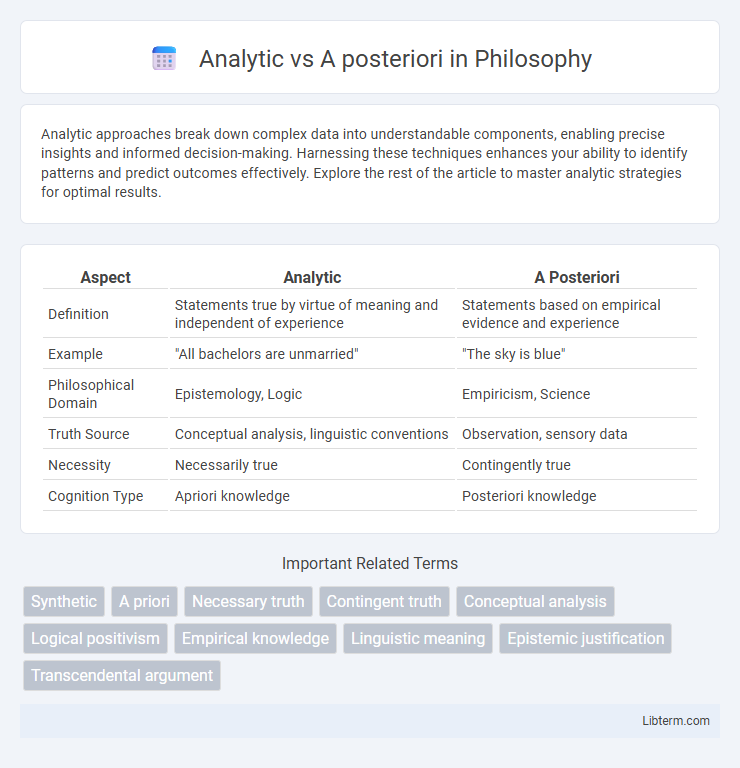Analytic approaches break down complex data into understandable components, enabling precise insights and informed decision-making. Harnessing these techniques enhances your ability to identify patterns and predict outcomes effectively. Explore the rest of the article to master analytic strategies for optimal results.
Table of Comparison
| Aspect | Analytic | A Posteriori |
|---|---|---|
| Definition | Statements true by virtue of meaning and independent of experience | Statements based on empirical evidence and experience |
| Example | "All bachelors are unmarried" | "The sky is blue" |
| Philosophical Domain | Epistemology, Logic | Empiricism, Science |
| Truth Source | Conceptual analysis, linguistic conventions | Observation, sensory data |
| Necessity | Necessarily true | Contingently true |
| Cognition Type | Apriori knowledge | Posteriori knowledge |
Understanding Analytic Statements
Analytic statements are true by virtue of their meaning and logical form, making them necessarily valid without requiring empirical evidence. Understanding analytic statements involves recognizing how their truth depends solely on the definitions of the terms involved, such as "All bachelors are unmarried." This contrasts with a posteriori statements, which require experience or observation to verify their truth.
Defining A Posteriori Knowledge
A posteriori knowledge is empirical knowledge derived from sensory experience and observation, contrasting with analytic knowledge, which is true by definition and independent of experience. It relies on evidence gathered from the external world to establish facts and validate claims, playing a crucial role in scientific inquiry and inductive reasoning. Understanding a posteriori knowledge is essential for differentiating between knowledge that requires validation through experience and knowledge that is true by logical necessity.
Key Differences Between Analytic and A Posteriori
Analytic judgments are true by definition, relying on the meanings of the terms involved, while a posteriori judgments depend on empirical evidence and sensory experience for validation. Key differences include the nature of necessity and certainty: analytic statements are necessarily true and do not require verification beyond linguistic analysis, whereas a posteriori statements are contingent and require observation or experimentation. These distinctions highlight the contrast between logical truths derived from language versus factual truths grounded in experience.
Historical Context and Philosophical Origins
Analytic knowledge, rooted in early modern philosophy, notably in the works of Immanuel Kant and the logical positivists, denotes truths derived from the meanings of concepts and logical deduction, emphasizing a priori reasoning independent of empirical evidence. A posteriori knowledge, by contrast, originates from empirical observation and sensory experience, grounded in the philosophical traditions of empiricism championed by John Locke and David Hume, stressing knowledge gained after or from experience. The historical context highlights a fundamental epistemological division that shaped debates in analytic philosophy, metaphysics, and the development of scientific methodology.
Examples of Analytic Propositions
Analytic propositions are statements true by definition, such as "All bachelors are unmarried men," where the predicate is contained within the subject. Examples include "Triangles have three sides" and "A square has four equal sides," illustrating that their truth can be established through analysis of concepts alone. These propositions contrast with a posteriori statements, which require empirical verification beyond conceptual analysis.
Examples of A Posteriori Judgments
A posteriori judgments rely on empirical evidence and experience, such as the statement "Water boils at 100degC at sea level," which is confirmed through observation and experimentation. Another example includes "The Eiffel Tower is in Paris," a fact verified through sensory data rather than pure logic. These judgments contrast with analytic ones by depending on external information rather than definitions or inherent meanings.
Analytical Reasoning in Everyday Life
Analytical reasoning involves systematically breaking down complex problems into smaller components to draw logical conclusions, making it essential in decision-making and problem-solving in everyday life. A posteriori knowledge relies on empirical evidence gathered through experience and observation, while analytic reasoning often uses a priori principles, allowing individuals to deduce truths independently of sensory input. Understanding the distinction between analytic reasoning and a posteriori knowledge enhances critical thinking and enables more effective analysis of real-world situations.
The Role of Empirical Evidence in A Posteriori Knowledge
A posteriori knowledge relies fundamentally on empirical evidence gathered through observation and experimentation, which validates or refines theoretical claims. This empirical grounding distinguishes it from analytic knowledge, which depends solely on logical relations and definitions without recourse to sensory data. The role of evidence in a posteriori knowledge is critical, as it ensures that knowledge claims correspond to real-world phenomena and can be tested for accuracy and reliability.
Philosophical Debates and Critiques
Analytic propositions are true by definition, relying on the principle of non-contradiction, whereas a posteriori knowledge depends on empirical evidence and sensory experience. Philosophical debates often center on Immanuel Kant's distinction, challenging whether synthetic a priori knowledge is possible and questioning the limits of human understanding. Critics argue analytic statements lack substantive content, while a posteriori claims face issues of skepticism and inductive reasoning.
Practical Implications in Modern Philosophy
Analytic judgments, grounded in the principle of non-contradiction, offer clarity and definitional truth essential for logical analysis and linguistic precision in modern philosophy. A posteriori knowledge, derived from empirical observation and experience, drives scientific inquiry and practical decision-making by providing verifiable and contingent information about the world. The practical implications highlight a tension between conceptual necessity and empirical adaptability, influencing epistemological frameworks and methodologies across contemporary philosophical discourse.
Analytic Infographic

 libterm.com
libterm.com